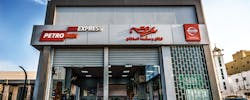In the 21st century, the world’s economy is truly linked together like never before. As China, and even parts of Africa, experience a burgeoning middle class, this has increased the demand for Middle Eastern oil. The result of demand for black gold has meant, even as prices fell in the United States thanks to increased American production, demand for raw resources from Saudi Arabia and its neighbors has literally allowed skyscrapers to rise in the desert.
At the same time, these nations have begun to think forward beyond just oil production for their future economic growth and have built tourist economies to supplement that growth. This, in turn, has created a new middle class in the Kingdom of Saudi Arabia and the United Arab Emirates (UAE). All these factors equate to more cars than ever before on the roads of the Arabian Peninsula.
Where there are more cars on the road, there needs to be auto service providers. The quick lube industry has recently found a steady place in the Saudi market. Quick isn’t just the time it takes to service a vehicle; quick could also be used to describe the growth the country’s largest quick lube chain has seen in the past decade.
It was only three years ago that Saudi Arabia-based Petromin, which had 308 Petromin Express stations in operation at the time, forecast it would have 500 quick lubes up and running by the year 2020. Last year, it actually surpassed this goal, when it opened its 646 station in the Arabian Peninsula. They also have 13 fuel/convenience stations, 19 repair facilities/full-service auto care workshops and six car dealership showrooms in operation. As a result, at the tail end of 2016, it vastly revised its goal.
“Our new target is to have 1,400 stations by 2020,” said Waheed Shaikh, COO of the Al-Dabbagh Group and executive director, Petromin. “Our core market will remain in Saudi Arabia, and we expect to launch four new stations every week. We opened 200 stations in 2016 and plan to keep that volume of expansion going throughout 2017 and beyond.”
Meeting this goal may be seen as no small feat, but the company has reliably shown it is more than up to the task.
Until recently, most drivers in the Kingdom had to go to the dealer for even basic automotive maintenance. In many cases, it had to be scheduled in advance and would require 24-48 hours for the service to be performed. The only alternative was low-priced — but what could be described as unprofessional or even low-quality — independent shops that often didn’t stock the necessary parts. With practically nothing in the middle, Petromin Express seized this opportunity, which has resulted in rapid growth.
Largest Lube Brand Outside North America
Recently, Petromin Express has earned the distinction of becoming the fourth largest quick lube network in the world — and the largest quick lube brand outside the United States. With its nearly 650 company owned locations, it is now the quick lube chain with the most company-owned shops.
It has been able to expand thanks in part to replicating the North American quick lube business model and establishing relationships with several North American vendors. This has ensured only top-quality products are used in its facilities, and these vendors include Mighty Auto Parts — its primary supplier of filter, wiper and specialty fluid products — and True Brand — its chemical supplier. Other vendors include AC Delco for batteries and Sage Microsystems for point-of-sale systems.
The company’s origins were actually as a consumer, commercial and industrial lubricants manufacturing and marketing company. In the past decade, it has literally upended the way it operated in Saudi Arabia. Petromin Express set its sights on delivering improved service. Today, Petromin Express shops offer competitor brands as well as its own. Appointments do not need to be pre-booked, while customers receive clean and spacious waiting areas with TVs, beverages and reading materials. Petromin Express has a goal of servicing vehicles in under 30 minutes, which is key to why this brand continues to expand to reach the growing market. Through these efforts, it has filled a void in the Saudi market, where until the launch of Petromin Express drivers had to either take their cars to the dealer to be serviced or to one of the small independent shops.
Saudi Arabia has a population of just around 30 million, with the capital city, Riyadh, accounting for more than one-sixth of the nation’s populace, followed by Jeddah. The distances between cities is vast, but thanks to affordable fuel most people travel by car.
“Our population is in three main areas: The west coast cities, including Jeddah, Riyadh in the middle and eastern cities, including Hofuf and Damman,” Shaikh explained. “In most of our cities, public transportation is virtually non-existent, so people truly rely on their cars.”
The Kingdom, which saw its domestic oil production increase by more than 3 percent to record-highs in 2015, has a high standard of living and a per capita income of more than $55,000. Its people generally enjoy a decent standard of living, due in a large part to government programs that were designed to minimize poverty, and the cost of living in Saudi Arabia is about 36 percent lower than that of the United States. Its citizens, thus, benefit from what Shaikh described to be a combination of inexpensive cars and cheap oil. Gasoline is still less than $0.76 a gallon, and that was after a price hike of nearly 50 percent at the beginning of last year made in an attempt by the government to reduce the fiscal deficit by the removal of some subsidies.
“Every household has a car, and there are currently more than 8.5 million cars on the road today,” Shaikh added.
With 31.6 percent of the market share, the nation’s top automotive brand is Toyota, and Japanese vehicles are very common. It is worth noting that Petromin has also become only the second authorized dealer for Nissan vehicles in Saudi Arabia. Currently, Nissan has about 8.2 percent of the market. Other popular car brands include Ford, Chevrolet, BMW, Mercedes-Benz and Hyundai, but there are now a wider range of cars on the roads than ever before. The current average new price of a vehicle in Saudi Arabia is between $22,000-$22,500. The market for used vehicles is fragmented and largely unorganized at the present time, but the average age of vehicles is around eight years old. However, no matter the vehicle, in Saudi Arabia, when it comes to cars, the owners take them in for service rather than trying to do even simple maintenance.
“When it comes to Saudi Arabia, it is 100-percent do-it-for-me,” Shaikh said. “No one changes their own oil, and no one does their own automotive repairs.”
While vehicle owners may not be interested in doing their own service, they also don’t tend to put it off. The weather, which includes extremely hot, dry and dusty summers, can be very rough on automobiles. Temperatures in the summer in the capital average 96 F (36 C), but increasing temperatures can reach 120 F (49 C).
“Even with our high standard of living, the car is an essential investment, and Saudi people like to see it last,” Shaikh explained. “They will take it in for oil change rather frequently — sometimes every 3,000 miles or sometimes even less. This is because everyone commutes in their cars. The extreme weather is harsh on engines, and tire wear out is common.”
New Legislation Means New Opportunities
One significant factor that has aided Petromin Express’s growth is that during the past decade the Ministry of Commerce in Saudi Arabia issued new legislation directed at dealerships that was a serious game changer for service operators. Previously, dealerships denied warranties if consumers went outside their businesses for an oil change, but under the new law warranties are fully covered — similar to the Magnuson-Moss Act in the United States. As a result, in Saudi Arabia, dealers cannot deny the consumer coverage if they have a professional oil change completed at an aftermarket shop.
Petromin not only offers oil changes through its quick lube brand, Petromin Express, but also has its own brand of lubricants.
“Currently, 85 percent of the oil that our customers choose is our oil,” Shaikh said. “The truth is, the majority of customers don’t specify a brand. It isn’t really the oil that is a determination of why we have a loyal following. Our customers like our service standards, and we treat our customers with respect. In 2001, our market share was just 2 percent. Now, it is 37 percent, and we are competing as a global brand.”
This global distribution is notable because Petromin Express opened its first centers in Egypt, the UAE and Pakistan in 2016. While these have been small steps in the region, it is the first of its kind for a non-North American or non-European quick lube chain.
Closer to home, Petromin is laser-focused on growth. One of its newest ventures is into full-service repair shops — officially dubbed as “workshops.” Petromin Express currently operates 19 workshops. Six of them were organically grown, and 13 were bought out by acquisition of two existing local networks: RedCap and TriStar. The workshops are located in Riyadh and Jeddah. Petromin Express plans to grow these full-service repair facilities through further acquisitions via its fuel station footprint. Petromin set a goal of having 75 full-service workshops running by 2020, and each will offer multi-branded repair for drivers in Saudi Arabia.
Petromin has expanded from lubricant maker to quick lube service center to full service workshop operator, but next up is expanding its new car dealerships.
“We opened one showroom as a dealership with Nissan in October 2015 and look to expand that in 2017,” Shaikh said. “We have become the No. 1 lube shop with 37 percent of the market, and we accept that even as we expand that business there isn’t much room to grow. This is why we are expanding to workshops and then to dealerships.”
The company is forward-thinking in other ways, as well. To this end, it ensures all of its used oil and filters are recycled through a third-party vendor for proper disposal. The same is true of used batteries and other waste products. This is important to note, because even as these have become common and required practices in the United States and Europe, these procedures are often ignored or not regularly followed in many parts of the Middle East.
Petromin has made it clear that it has sought to lead by example and be the trendsetter in this regard for environmental safety.
“We strive to do better,” Shaikh said. “This business has been an interesting journey for us,” he added. “We want to compete with multi-national businesses, and because we were a local Saudi brand, we knew to compete, we had to change the rules of our game.”
About the Author

Peter Suciu
Peter Suciu is Michigan-based writer and NOLN freelance contributor who has contributed to more than four dozen magazines, newspapers and websites. He lives in the land of cars not far from one of Henry Ford's estates.
